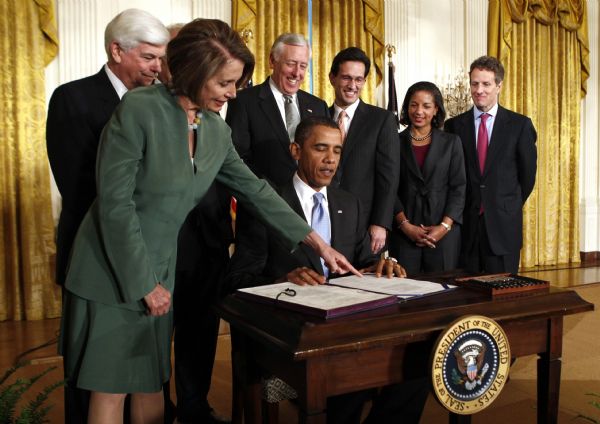U.S. military strike against Iran unlikely
U.S. President Barack Obama has indicated sanctions on Iran should remain in place but he has hope for a "pathway" to a peaceful settlement of the nuclear issue with Tehran.
 |
|
Speaker of the House Nancy Pelosi leans in as U.S. President Barack Obama signs the Iran Sanctions Act at the White House in Washington July 1, 2010. [Xinhua/Reuters File Photo] |
Obama told reporters at the White House Thursday he is still open to talks with Iran if Tehran takes "confidence-building measures" to prove it is not pursuing nuclear weapons, the Washington Post reported.
The remarks appeared to conflict with those by U.S. chairman of the Joint Chiefs of Staff, Adm. Mike Mullen, who said Washington had a plan to use military measures to deny Iran nuclear weapons.
Many analysts believe the current U.S. administration still prefers sanctions when it comes to the Iranian nuclear issue and a military strike would be its last resort.
Military strike unlikely
Mullen said on NBC's "Meet the Press" Sunday that a military option against Iran had not been ruled out. "It's one of the options that the president has. Again, I hope we don't get to that, but it's an important option and it's one that's well understood."
The prospects of an attack and of a nuclear-armed Iran were both very worrisome, he said, adding that he believed multilateral diplomacy and international economic sanctions remained the best means to force the Iranian government to abandon its nuclear program.
Michael O'Hanlon, director of research of foreign policy at the Washington-based Brookings Institution, said the United States was unlikely to launch a military strike against Iran.
"To say that an option is on the table is not the same thing as to say there is a detailed plan. Detailed plan implies real preparation and readiness to carry this out. It implies the almost potential imminence, whereas keeping this as an option is just that," he said.
O'Hanlon cited Obama's policy against preemptive strikes. "Because, in the end, this will in many ways be a form of preemption. President Obama campaigned against the idea of preemption."
The United States will more likely seek cooperation with other world powers -- China, France, Britain and Russia -- and try to put Iran under economic pressure, he said.
Since June, the United Nations, the United States and the European Union have tightened sanctions on Iran over its refusal to return to international talks on its nuclear program, which the West fears is a cover to build an atomic bomb. Tehran denies the allegation, saying it is for the generation of electricity.
The other reason a military strike was unlikely, O'Hanlon said, was that it would not be very effective.
"It (a military strike) will probably set Iran back a couple of years. But Iran could relocate and build new facilities," he said, adding that Tehran would have much more determination and domestic support to carry out its nuclear program.
Besides, "a lot of countries around the world, in the aftermath of the strike, may decide not to continue to apply sanctions, so we might lose ground on sanctions. On all the political and economic fronts, a military attack will set us back," he said.
"If you add up the pros and cons, the equation looks fairly unfavorable for using force," the expert said.
 0
0 







Go to Forum >>0 Comments